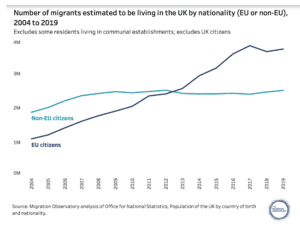Since the referendum, it has been almost impossible to write about Brexit without incurring somebody’s wrath. There are still a few who insist on re-fighting history’s battles, but it does now appear that the majority have accepted there is no going back: Brexit is a fait accompli.
Of course, we don’t actually know just how it will all pan out, but there is one thing that I am sure of, and that is those businesses which take a positive outlook and seek to take advantage of those opportunities that come from Brexit will do better than those who wring their hands and fulminate. You may not be happy, but why would any business owner want his or her business not to succeed – and why would they do anything that prevented it from doing so?
From our perspective at Global Connects, we have never sought to provide a service that focuses only on a specific range of languages, whether European or otherwise. We love the diverse array of fascinating tongues spoken across our planet and are happy to help any business or public body that needs to communicate with audiences whose first language is different from those of its (potential) customers. It’s what we do. Whether we agree with Brexit or not is immaterial: the cards have now been dealt and we have to play them as best we can.
Consequently, we are looking at Brexit positively. We know (because they have told us) that many of our private sector clients are going to seek new markets outside Europe. They want to expand geographically and they know they need the help of language specialists to do so successfully.
Trade with Europe will continue, albeit with some more paperwork. There will be issues, of that there is no doubt, but you can remove potential obstacles by ensuring that all the required admin has been done in each and every language necessary. We are not saying lorry drivers need to learn French (although it might be useful!) but the general expectation amongst the language industry experts I speak to is that Brexit will result in a more translation work with European languages, not less.
In addition, one area which I think may be neglected by the language industry is recruitment. The feeling in the recruitment agencies is that with a level playing field for the entire world now, there is the likelihood that we’ll see more immigrants coming for jobs in the UK from non-EU countries, even if the numbers from the EU decline slightly. I admit, I was surprised when I investigated this. It was only in 2012-13 that EU immigration overtook non-EU immigration (see graph below).
There are some major areas of skills shortage in quite a few industries, notably tech and engineering. The UK’s provision and take-up of STEM education is insufficient to make up this shortfall and consequently recruiters will be keen to bring in people from abroad where they can. With the new, points-based rules for immigration, the more savvy headhunters will be looking to Asia and the Far East – areas which were difficult previously – for candidates. Interpreters and translators who specialise in the relevant languages and who understand the UK’s £multi-billion recruitment industry (the third largest in the world) will find their skills in demand.
Similarly, when we start to consider specific industries such as fish and food we can see that they are being forced to change as much by Covid as by Brexit. Together, these two factors have pushed fishermen and food producers to seek out other markets, whether abroad or at home. For example, Scotland catches over two-thirds of the world’s langoustines, but for years most of them have been sent to Europe, mainly the Mediterranean. Covid in particular has hit these exports, and indeed the domestic market in the UK, but the industry has been working hard to find new sales opportunities. As with many areas of business, if you don’t adapt you will go bust. No-one wants the latter. We can find inspiration from New Zealand, where the Labour government stopped subsidising agriculture in the 1980s but despite that Kiwi farmers made changes and survived. The resourceful business owner will always seek new opportunities, whether for lamb or langoustines, and inevitably these include new markets overseas. And even allowing for English being the lingua franca of international commerce, it is far easier to do business in your customers’ own language. Which is why, despite Covid and despite Brexit, at Global Connects we are optimistic about the coming year.
Finally, although Covid has had a far larger impact on the economy than Brexit will have, the fact is that millions of people throughout Europe love to travel to visit each other’s countries. That pleasure has been almost entirely removed from them in the last year, but with the vaccines, tourism will come back. Once the threat of the pandemic has receded, millions will once again want to fly to Spain’s beaches, to Rome, Paris and Prague. Likewise, many Europeans will want to visit London, Edinburgh and Dublin, the Lake District and the Scottish Highlands. The efforts that will go into attracting these visitors to each and every country (and those beyond Europe) will be immense over the next few years, and again translation companies will have a major part to play in helping hoteliers, heritage and hospitality to regain markets lost to Covid. We’re not naive: we know it won’t happen overnight, but at Global Connects we are alive to the challenges and see markets bristling with possibilities – despite Brexit and Covid. If you share our mindset, give us a call. Together, let’s do business.
Fiona Woodford, Head of Language Services, Global Connects

